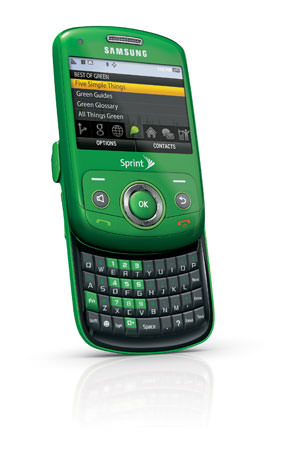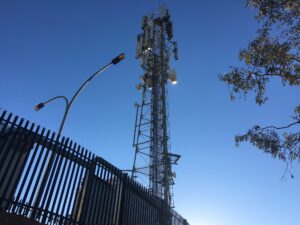The Phone Made Out of Corn
The Samsung Reclaim is an odd little device that raises the question: Why isn't everything made out of corn?
The Samsung Reclaim is an odd little device that raises the question: Why isn’t everything made out of corn?
The Reclaim is a new green phone (literally) from Samsung and Sprint that hopes you’re more interested in the environment than in apps. To that end, it’s built out of corn. That’s overstating it a little: Forty percent of the phone is made from a corn-based bio-plastic, which is blended with traditional plastic for durability. But the green credentials don’t end there.
Samsung also ditched some of the harmful toxins typically found in consumer electronics. The company claims 80 percent recyclability. The charger is designed to consume less power, and the phone itself suggests ways to use less energy. When you disconnect the Reclaim from its charger, for example, a message appears on the screen to let you know that leaving the cord plugged into the wall wastes electricity. The phone is packaged in recycled materials, imprinted with soy-based ink. The box even includes a little preaddressed pouch in case you want to send your old phone off to be recycled. Sprint, the phone’s carrier, is donating $2 from every purchase to the Nature Conservancy. And in case you didn’t get the point, the device includes a “Best of Green” menu with green tips, guides and glossaries.
Beyond all the greenery, the Reclaim has a convenient slide-out QWERTY keyboard for messaging, a refreshingly loud speakerphone, a 2-megapixel camera with video capability, and Facebook, MySpace and E-mail apps.
Sprint’s network doesn’t have the best reputation, but I found coverage in the Los Angeles area to be very good. Although the phone’s data connection was spotty, I had no problems with voice calls. I managed to have uninterrupted conversations in a particular L.A. canyon that has caused AT&T users no end of grief, and I had no problem with dropped calls or reception.
That doesn’t mean I had such a great time taking and placing calls. Call audio quality was OK, not great, and dialing was a real pain. The phone’s slide-out keyboard is useful for firing off text messages, but poor key definition on the combo alphanumeric pad makes dialing a number not stored in your address book a trial-and-error affair.
The phone’s user interface could be better, too. There’s a sort of mini-menu carousel that’s meant to give easy access to popular items, but it made for more confusion than convenience. On the plus side, the 2.4-inch QVGA screen was crisp and bright and the phone has the potential for plenty of storage thanks to a microSD card slot.
The Reclaim comes preloaded with social networking portals and offers more apps and music via download, but the lousy data connection makes actually using those features a tedious chore. Setting up and using e-mail was easy enough. However, disabling the phone’s obnoxious key-press noises is a must.
The Reclaim is difficult to recommend despite its green virtues, and not because of these relatively minor complaints. The phone is available now from Sprint for $49.99 with a two-year contract and a $50 mail-in rebate. That’s only $50 cheaper than the cheapest iPhone, with its thousands of apps, unrivaled Web browsing, iPod features, music store and more. On Sprint’s own network, you can use the Palm Pre, which rivals the iPhone in many ways, including price. A slew of new Google Android phones will be released later this year, with similarly advanced Internet, media and productivity features. In short, there has never been a better time in gadget history to buy a smart phone (as long as it’s not running Windows Mobile). As of this writing, Amazon has dropped the Reclaim price to just 1 cent. It’s still hard to walk away from the unprecedentedly cheap and functional smart phones out there, but that price point is a lot more appropriate given the competition.
The Reclaim is a statement phone — a quick and easy way to demonstrate a commitment to a better world. Holding the sturdy little thing, it’s an absolute mystery why all phones aren’t made from the same materials and with the same environmental standards. Samsung says that “creating an eco-centric phone takes more time, money and research to develop than other mobile phones.” The company could charge a premium, and people would pay it. Right now, this is the only phone in the U.S. marketed primarily on the basis of its green cred. If that’s more important to you than watching videos, checking out Web sites and downloading ever more useful and innovative apps, snatch one up. It’s a shame you have to choose.
Your support matters…Independent journalism is under threat and overshadowed by heavily funded mainstream media.
You can help level the playing field. Become a member.
Your tax-deductible contribution keeps us digging beneath the headlines to give you thought-provoking, investigative reporting and analysis that unearths what's really happening- without compromise.
Give today to support our courageous, independent journalists.






You need to be a supporter to comment.
There are currently no responses to this article.
Be the first to respond.